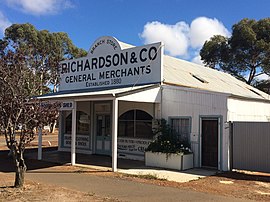Town in Western Australia
| Woodanilling Western Australia | |
|---|---|
 Building in Woodanilling Building in Woodanilling | |
 | |
| Coordinates | 33°34′00″S 117°26′00″E / 33.56667°S 117.43333°E / -33.56667; 117.43333 |
| Population | 207 (SAL 2021) |
| Established | 1892 |
| Postcode(s) | 6316 |
| Elevation | 311 m (1,020 ft) |
| Area | 89.5 km (34.6 sq mi) |
| Location | |
| LGA(s) | Shire of Woodanilling |
| State electorate(s) | Roe |
| Federal division(s) | O'Connor |


Woodanilling is a small town and locality in the Shire of Woodanilling, Great Southern region of Western Australia.
Location
The town is 254 kilometres (158 mi) south of Perth on the Great Southern Highway, 24 kilometres (15 mi) from Katanning and 30 kilometres (19 mi) from Wagin.
The town is in a sheep and grain producing area and was named after a spring in the Boyerine Creek, found about 1 kilometre (0.6 mi) south of town.
History
The Wiilman people of the Noongar nation are the traditional owners of the Woodanilling area. The name Woodanilling means in Noongar language "the place of little fishes".
During 1830–31, the area was first explored by Europeans, in expeditions by Captain Thomas Bannister. The construction of Albany Highway in the early 1850s and the Great Southern Railway in 1889 brought settlers to the area and helped to establish the town, which was located on a railway siding that was initially known as Round Pool. The townsite was gazetted in 1892. In 1895 it was renamed Yarabin and changed finally to Woodanilling the following year (1896). The name Woodanilling is Aboriginal in origin and means either "lots of minnows" or "place where the bronzewing pigeon nests".
An agricultural hall and public school were built in the town prior to 1903 (when the school was closed temporarily after the teacher, a Mr Campbell, was transferred).
By 1906, the Woodanilling Road Board was formed and the population of the shire swelled to 800, during its most prosperous period (1905 to 1920). At around this time the town boasted five general stores, a blacksmith, post office, bakery, hotel, railway station and trotting track.
"Mallet" (marlock or mallee) bark was also exported from the area in large quantities by 1907.
The foundation stone of the local Baptist church was laid in 1908 in front of a large gathering including the local pastor, Rev. W. Kennedy.
The Western Australian Bank branch and new hotel were erected in the town in 1908, along with many improvements being made to the school. Local farmers were confident of a bumper crop after experiencing favourable conditions for the year. The railway station yard was upgraded later the same year, a weighbridge, new crossing, tracking yards and enlarging the current yard were all completed the following year. The school changed teachers four times in 1908, with finding suitable quarters being the main problem. The school was also enlarged to cater for the growing enrolment.
Between 1920 and 1960 migrants from Ireland, Germany, England and even China arrived contributing to the fabric of the local community.
The local school was destroyed by fire in June 1949, the school had 64 students enrolled at the time. By November the minister of education decided that a new primary school would be built but older students would travel to Katanning for their classes.
Economy
The town services the surrounding area which is primarily concerned with sheep and wheat.
Nature reserve
The Woodanilling Nature Reserve, east of the townsite, was gazetted on 8 September 1911, has a size of 1.34 square kilometres (0.52 sq mi), and is located within the Avon Wheatbelt bioregion.
References
- Australian Bureau of Statistics (28 June 2022). "Woodanilling (suburb and locality)". Australian Census 2021 QuickStats. Retrieved 28 June 2022.

- "SLIP Map". maps.slip.wa.gov.au. Landgate. Retrieved 15 October 2024.
- "NationalMap". nationalmap.gov.au. Geoscience Australia. Retrieved 15 October 2024.
- "History of country town names – W". Western Australian Land Information Authority. Archived from the original on 14 March 2022. Retrieved 8 June 2007.
- "Woodanilling". Western Mail. Perth. 17 October 1903. p. 21. Retrieved 7 June 2012 – via National Library of Australia.
- "Shire of Woondanilling". 2008. Retrieved 12 September 2008.
- ^ Heritage Walk Signage.
- "Country". The West Australian. Perth. 27 December 1907. p. 2. Retrieved 7 June 2012 – via National Library of Australia.
- "Woodanilling notes". Western Mail. Perth. 22 February 1908. p. 9. Retrieved 7 June 2012 – via National Library of Australia.
- "Woodanilling". Western Mail. Perth. 5 September 1908. p. 6. Retrieved 7 June 2012 – via National Library of Australia.
- "Woodanilling". Western Mail. Perth. 12 December 1908. p. 9. Retrieved 7 June 2012 – via National Library of Australia.
- "Woodanilling notes". Western Mail. Perth. 10 October 1908. p. 41. Retrieved 7 June 2012 – via National Library of Australia.
- "Woodnailling School". The West Australian. Perth. 3 September 1949. p. 5. Retrieved 7 June 2012 – via National Library of Australia.
- "Woodanilling School". The West Australian. Perth. 7 July 1949. p. 12. Retrieved 7 June 2012 – via National Library of Australia.
- "Building of School". The West Australian. Perth. 2 November 1949. p. 15. Retrieved 7 June 2012 – via National Library of Australia.
- "Terrestrial CAPAD 2022 WA summary". www.dcceew.gov.au/. Department of Climate Change, Energy, the Environment and Water. Retrieved 9 November 2024.